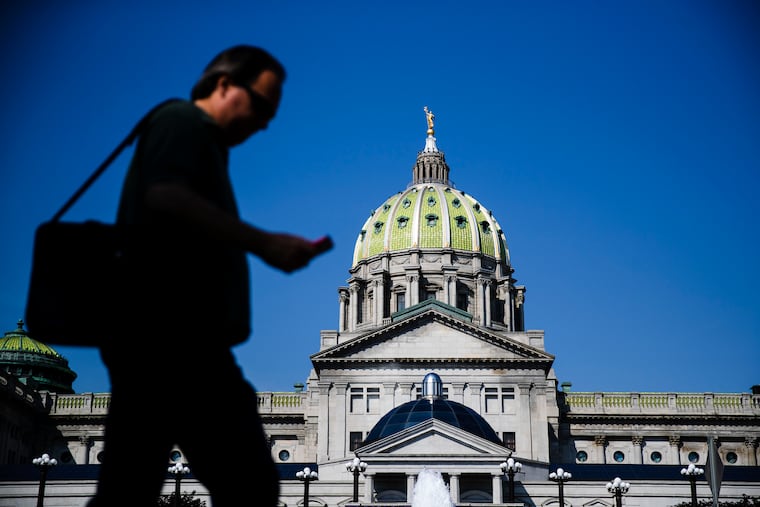Pa. got $1B more in taxes than expected. Officials say federal tax changes, online sales taxes made that happen.
That boost allowed lawmakers to put $317 million into the state’s Rainy Day Fund, and the rest of the surplus will fund new initiatives and expansion of existing programs, according to Gov. Tom Wolf’s office.

Pennsylvania has had a very good year — likely a historic one — for tax collections, earning nearly $1 billion more than anticipated in the fiscal year that ended June 30.
That boost allowed lawmakers to put $317 million into the state’s so-called Rainy-Day Fund, and the rest of the state’s $883 million surplus will fund new initiatives and expansion of existing programs, according to Gov. Tom Wolf’s office.
Politicians in Harrisburg have their own takes on what that means.
Republicans, who control the House and Senate, point to the high revenues as evidence that their fight to rein in spending and prevent tax increases has been a success. Wolf, a Democrat, emphasized that a big chunk of the additional spending this year will go toward education.
And lawmakers from both parties said it’s important to set aside some surplus money.
But what led to such a large increase in tax revenue? The state’s Independent Fiscal Office found a few key reasons and outlined them in a report issued in June.
Federal tax changes and a good year for business
Changes in federal laws, from the Tax Cuts and Jobs Act passed by a Republican-controlled Congress in 2017, led to a portion of Pennsylvania’s revenue increases, according to the Independent Fiscal Office.
“I suspect that we had maybe underestimated the impact of those tax law changes,” said Matthew Knittel, director of the Independent Fiscal Office.
Knittel said a big chunk of that impact is in corporate net income taxes; his office initially estimated $3.1 billion in revenue for the last fiscal year, but increased that estimate last month by $306 million.
The federal changes expanded the tax base, Knittel said, by eliminating some deductions that corporations used to get — and that meant they could no longer claim those deductions on Pennsylvania taxes, either.
Corporate profits have also increased more than expected. There are no statewide data, but Knittel said a nationwide measure of corporate profits from non-financial firms is telling: Profits increased by 10.7 percent in 2018.
Taxing internet sales offers another boost
Expanded online sales taxes also contributed millions in new revenue to the state in the past year.
Under a state law passed in 2017, third-party sellers who use websites such as Amazon Marketplace or Etsy to market their goods must collect sales tax.
A U.S. Supreme Court ruling last year allowed some states to begin taxing online marketplace sales, and in Pennsylvania, officials expanded their interpretation of which sales are taxable.
The Department of Revenue had initially estimated that it would earn $50.5 million in online marketplace sales taxes in the fiscal year, but between last July and March, the state collected more than $151 million.
Knittel said the marketplace sales account for a portion of increased sales taxes. Overall, his office raised its sales-tax projection by $300 million, and the Independent Fiscal Office said about $168 million of that can be attributed to marketplace sales taxes. Overall, the office increased its sales and use tax projection for the fiscal year that just ended to $12.8 billion.
Gaming expansion
Pennsylvania’s recently expanded gambling laws also provided a revenue boost; the Independent Fiscal Office said licenses and fees revenue will exceed projections by $93 million, mostly the result of gambling.
Unlike the other taxes, this is a one-time revenue source, Knittel said, because the increase is largely tied to issuing initial licenses for expanded internet gaming.
Knittel said the increased revenue projections also do not take into account expenses associated with expanding gambling; his report looked only at revenue.
Recurring revenue
In case of future trouble, lawmakers said, this year’s addition to the Rainy-Day Fund will help.
“Growing our Rainy-Day Fund means that in worse economic times, we have funds to avoid the disastrous cuts we’ve seen in the past,” Wolf said in a statement.
Jenn Kocher, a spokesperson for Senate Republicans, said responsible budgets must also remain a priority. The Senate has helped trim billions of dollars from budgets proposed by the governor, she said, “holding spending increases below the rate of inflation.”
House leaders also took credit for this year’s high revenues; Majority Leader Bryan Cutler (R., Lancaster), said at a May news conference that the increased revenue is “one part of the impact of fiscal responsibility and sound policymaking.”
Knittel’s analysis said the bump isn’t a one-time phenomenon: Much of the additional revenue collected in the past year is permanent. That means it will continue to flow in at comparable levels, with the exception of revenue from gambling licenses.
So Pennsylvania can expect even higher revenue next year — “barring a recession, of course,” Knittel added.